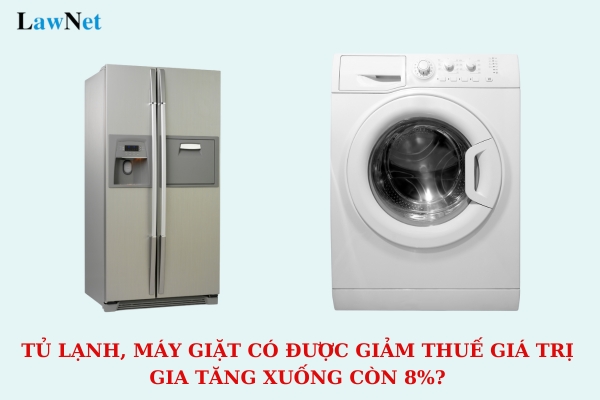Are refrigerators and washing machines eligible for a reduction in value-added tax to 8% in Vietnam according to Decree 72?
Are refrigerators and washing machines eligible for a reduction in value-added tax to 8% in Vietnam according to Decree 72?
Based on section B of Appendix II issued with Decree 72/2024/ND-CP, regulations on the list of information technology goods and services not eligible for value-added tax reduction include groups of household electronic devices such as: refrigerators and coolers, washing machines, microwave ovens, vacuum cleaners, air conditioning equipment, dehumidifiers, and others.
Thus, according to the above regulation, refrigerators and washing machines are goods not eligible for a reduction in value-added tax to 8% according to Decree 72/2024/ND-CP.

Are refrigerators and washing machines eligible for a reduction in value-added tax to 8% in Vietnam according to Decree 72? (Image from the Internet)
How to determine the place of payment for value-added tax in Vietnam?
According to the provisions of Article 20 of Circular 219/2013/TT-BTC, the determination of the place of payment for value-added tax is as follows:
- Taxpayers declare and pay value-added tax at the locality where production or business is conducted.
- Taxpayers declare and pay value-added tax according to the deduction method with dependent accounting production facilities located in a province or city different from the province or city where the head office is located must pay value-added tax in the locality where the production facility and the head office are located.
- In cases where enterprises or cooperatives applying the direct method have production facilities in a province or city different from the head office or have retail operations in other provinces, the enterprises or cooperatives perform tax declaration and payment according to the percentage on revenue for revenues arising in other provinces at the locality where the production facility is located. Enterprises or cooperatives are not required to pay value-added tax according to the percentage on revenue at the head office for revenues arising in other provinces that have already been declared and paid.
- In cases of telecommunications service business establishments providing postpaid services in a locality different from the province or city where the head office is located and establishing dependent accounting branches paying value-added tax by the deduction method simultaneously participating in providing postpaid services in that locality, the telecommunications service business establishment is to declare and pay value-added tax for postpaid telecommunications services as follows:
+ Declare value-added tax for postpaid telecommunications service revenue of the entire business establishment with the tax authority directly managing the head office.
+ Pay value-added tax at the locality where the head office and branches are located.
The value-added tax payable at the locality where the dependent accounting branch is located is determined at the rate of 2% (for postpaid telecommunications services subject to a value-added tax rate of 10%) on revenue (excluding value-added tax) for postpaid telecommunications services at the locality where the dependent accounting branch is located.
- The declaration and payment of value-added tax are conducted following the regulations of the Tax Management Law 2019 and related guiding documents.
What are cases not subject to declaration and payment of value-added tax in Vietnam?
According to Clause 3, Article 2 of Decree 209/2013/ND-CP, the cases not subject to declaration and payment of value-added tax are as follows:
- Organizations and individuals receiving compensation, bonuses, support money, emission rights transfer, and other financial receipts.
- Organizations and individuals producing or doing business in Vietnam purchasing services from foreign organizations not having a permanent establishment in Vietnam and individuals abroad classified as non-residents in Vietnam, including cases:
+ Repair of means of transportation, machinery, and equipment (including materials and spare parts replacement);
+ Advertising, marketing; investment and trade promotion;
+ Brokerage for goods sales, service provision; training; sharing postal and telecom service charges between Vietnam and abroad where these services are performed outside Vietnam.
- Organizations and individuals not conducting business, not being subject to value-added tax, selling assets.
- Organizations and individuals transferring investment projects to produce or do business in goods and services subject to value-added tax to enterprises and cooperatives.
- Cultivation, husbandry, or fishery products not yet transformed into other forms or products that have only undergone simple processing are sold to enterprises or cooperatives, except as stipulated in Clause 1, Article 5 of the Value-Added Tax Law 2008.

